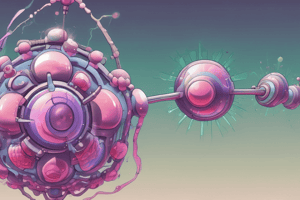Podcast
Questions and Answers
What is the primary role of glucocorticoids in response to inflammation?
What is the primary role of glucocorticoids in response to inflammation?
- Prevent the release of chemical substances from damaged tissues (correct)
- Increase blood flow to the affected area
- Promote vasodilatation in the injured site
- Enhance the migration of leukocytes into the affected area
Which of the following conditions is characterized by adrenocortical insufficiency?
Which of the following conditions is characterized by adrenocortical insufficiency?
- 17-α-HYDROXYLASE DEFICIENCY
- β-HYDROXYSTEROID DEHYDROGENASE DEFICIENCY
- Cushing’s Syndrome
- Addison disease (correct)
What effect does ACTH have on the skin?
What effect does ACTH have on the skin?
- It causes skin to become pale
- It induces vasodilatation in the skin
- It inhibits melanin production
- It results in darkening of the skin (correct)
In Cushing’s Syndrome, what symptom is commonly observed?
In Cushing’s Syndrome, what symptom is commonly observed?
Which deficiency leads to increased production of mineralocorticoids, causing hypertension?
Which deficiency leads to increased production of mineralocorticoids, causing hypertension?
What hormone is primarily responsible for controlling cortisol production?
What hormone is primarily responsible for controlling cortisol production?
Which of the following processes is stimulated by cortisol in response to stress?
Which of the following processes is stimulated by cortisol in response to stress?
What effect does rising cortisol levels have on CRH and ACTH release?
What effect does rising cortisol levels have on CRH and ACTH release?
What is formed when steroid hormones bind to their specific receptors?
What is formed when steroid hormones bind to their specific receptors?
Which of the following statements regarding steroid hormone metabolism is true?
Which of the following statements regarding steroid hormone metabolism is true?
How do glucocorticoids affect blood glucose levels?
How do glucocorticoids affect blood glucose levels?
What is the outcome of glucocorticoids having a mild mineralocorticoid effect?
What is the outcome of glucocorticoids having a mild mineralocorticoid effect?
What kind of hormones do steroid hormones belong to?
What kind of hormones do steroid hormones belong to?
Which of the following statements about glucocorticoids is true?
Which of the following statements about glucocorticoids is true?
What is the primary role of the cholesterol side-chain cleavage enzyme complex?
What is the primary role of the cholesterol side-chain cleavage enzyme complex?
Which glucocorticoid has the longest half-life?
Which glucocorticoid has the longest half-life?
Which synthetic glucocorticoid is 30 times more potent than cortisol?
Which synthetic glucocorticoid is 30 times more potent than cortisol?
What is the parent compound for all steroid hormones?
What is the parent compound for all steroid hormones?
How are steroid hormones primarily secreted?
How are steroid hormones primarily secreted?
Which of the following glucocorticoids provides about 4% of total glucocorticoid activity?
Which of the following glucocorticoids provides about 4% of total glucocorticoid activity?
What process is involved in the synthesis of steroid hormones from cholesterol?
What process is involved in the synthesis of steroid hormones from cholesterol?
What effect does hypersecretion of glucocorticoids have on blood glucose levels?
What effect does hypersecretion of glucocorticoids have on blood glucose levels?
What is a common consequence of glucocorticoid hypersecretion on protein metabolism?
What is a common consequence of glucocorticoid hypersecretion on protein metabolism?
Which of the following is a direct effect of glucocorticoids on fat metabolism?
Which of the following is a direct effect of glucocorticoids on fat metabolism?
What role do glucocorticoids play in water metabolism under normal conditions?
What role do glucocorticoids play in water metabolism under normal conditions?
How do glucocorticoids influence mineral metabolism?
How do glucocorticoids influence mineral metabolism?
What effect does glucocorticoid hypersecretion have on bone health?
What effect does glucocorticoid hypersecretion have on bone health?
What is one way glucocorticoids enhance the body's resistance during stress?
What is one way glucocorticoids enhance the body's resistance during stress?
What condition is likely to result from hyposecretion of glucocorticoids?
What condition is likely to result from hyposecretion of glucocorticoids?
Flashcards are hidden until you start studying
Study Notes
Steroid Hormones
- Cholesterol is the precursor to all steroid hormones:
- Glucocorticoids
- Mineralocorticoids
- Sex hormones
Glucocorticoids
- Glucocorticoids primarily affect glucose metabolism, but also regulate the metabolism of fats, proteins, and water
- Glucocorticoids include:
- Cortisol (95% of total activity)
- Corticosterone (4% of total activity)
- Cortisone (almost as potent as cortisol)
- Prednisone (synthetic, four times as potent as cortisol)
- Methylprednisone (synthetic, five times as potent as cortisol)
- Dexamethasone (synthetic, 30 times as potent as cortisol)
Glucocorticoid Chemistry and Half-life
- Glucocorticoids are C21 steroids, containing 21 carbon atoms
- Half-life:
- Cortisol: 70 to 90 minutes
- Corticosterone: 50 minutes
- Cortisone: Not Known
Glucocorticoid Synthesis
- Synthesis involves shortening the cholesterol hydrocarbon chain and hydroxylating the steroid nucleus
- The initial, rate-limiting reaction converts cholesterol to the 21-carbon pregnenolone
Glucocorticoid Synthesis Enzymes
- Cholesterol side-chain cleavage enzyme complex (desmolase)
- Cytochrome oxidase of the inner mitochondrial membrane
Glucocorticoid Synthesis Cofactors
- NADPH
- Molecular Oxygen
Pregnenolone
- The parent compound for all steroid hormones
- Pregnenolone is oxidized and isomerized to progesterone, which is further modified by hydroxylation reactions in the ER and mitochondria
Glucocorticoid Secretion
- Glucocorticoids are secreted on demand from their tissues of origin in response to hormonal signals
- Cortisol:
- Secretion is controlled by the hypothalamus
- Severe stress (infection) triggers the hypothalamus to produce corticotropin-releasing hormone (CRH) which travels to the anterior pituitary
- CRH induces the production and secretion of adrenocorticotropic hormone (ACTH)
- ACTH ("stress hormone") stimulates the adrenal cortex to synthesize and secrete cortisol
Cortisol Activity
- Cortisol allows the body to respond to stress by affecting intermediary metabolism
- Effects:
- Increased Gluconeogenesis
- Inflammatory and immune responses
Cortisol Negative Feedback
- As cortisol levels rise, the release of CRH and ACTH is inhibited
Steroid Hormone Action Mechanism
- Each steroid hormone diffuses across the target cell membrane and binds to a specific cytosolic or nuclear receptor
- These receptor-ligand complexes accumulate in the nucleus, dimerize, and bind to specific regulatory DNA sequences (hormone response elements, HRE)
- HREs are found in promoters or enhancer elements of genes regulated by a specific steroid hormone
- The steroid hormone superfamily includes receptors for steroid hormones, thyroid hormones, Vitamin D, and retinoic acid
Steroid Hormone Metabolism
- Steroid Hormones are converted to inactive metabolic excretion products in the liver
- Reactions include:
- Reduction of unsaturated bonds
- Introduction of additional hydroxyl groups
- Metabolites are made more soluble by conjugation with glucuronic acid or sulfate
- 20-30% of metabolites are secreted into the bile and excreted in the feces
- The remaining metabolites are released into the blood, filtered by the kidneys, and excreted in the urine
Glucocorticoid Functions
- Metabolic effects on carbohydrates, proteins, fats, and water
- Mild mineralocorticoid effect
Glucocorticoid Effects on Carbohydrate Metabolism
- Increase blood glucose levels by:
- Promoting gluconeogenesis in the liver from amino acids
- Inhibiting peripheral glucose uptake and utilization
- Hypersecretion:
- Increases blood glucose, leading to hyperglycemia, glucosuria, and adrenal diabetes
- Hyposecretion:
- Causes hypoglycemia and can be fatal during adrenal insufficiency
Glucocorticoid Effects on Protein Metabolism
- Promote protein catabolism, leading to:
- Decreased cellular proteins
- Increased plasma amino acid levels
- Increased protein content in the liver
- Hypersecretion:
- Excess protein catabolism results in muscular wasting and negative nitrogen balance
Glucocorticoid Effects on Fat Metabolism
- Mobilize and redistribute fats
- Actions on fats:
- Mobilization of fatty acids from adipose tissue
- Increased blood fatty acid concentration
- Increased fat utilization for energy
- Hypersecretion:
- Abnormal obesity with fat deposition in the abdomen, chest, face, and buttocks
Glucocorticoid Effects on Water Metabolism
- Accelerate water excretion
- Adrenal insufficiency causes water retention
Glucocorticoid Effects on Mineral Metabolism
- Enhance sodium retention and potassium excretion
- Hypersecretion:
- Edema, hypertension, hypokalemia, and muscular weakness
Glucocorticoid Effects on Bone
- Stimulate bone resorption (osteoclastic activity) and inhibit bone formation and mineralization (osteoblastic activity)
- Hypersecretion:
- Osteoporosis
- Decrease blood calcium by inhibiting intestinal absorption and increasing urinary excretion
Glucocorticoid Effects on Stress Resistance
- Enhance resistance through:
- Immediate release and transport of amino acids from tissues to the liver for protein and other substance synthesis
- Release of fatty acids from cells for energy production
- Enhancement of vascular response and fatty acid-mobilizing action of catecholamines
Glucocorticoid Effects on Inflammatory Reactions
- Prevent inflammatory reactions by:
- Inhibiting chemical release from damaged tissues (stabilizing lysosome membranes)
- Causing vasoconstriction (permissive action on catecholamines)
- Decreasing capillary permeability (preventing fluid loss from plasma)
- Inhibiting leukocyte migration to the affected area
- Suppressing T cells and other leukocytes, reducing inflammatory responses
Non-Adrenal ACTH Actions
- Melanocyte-stimulating effect (due to structural similarity to MSH)
- Causes skin darkening by acting on melanophores (pigment cells containing melanin)
Diseases
- β-Hydroxysteroid Dehydrogenase Deficiency:
- Virtually no glucocorticoids, mineralocorticoids, active androgens, or estrogens are produced
- 17-α-Hydroxylase Deficiency:
- Virtually no sex hormones or cortisol are produced
- Increased mineralocorticoids cause sodium and fluid retention, leading to hypertension
- Addison Disease:
- Autoimmune destruction of the adrenal cortex, leading to adrenocortical insufficiency
- Cushing’s Syndrome:
- Hypercortisolism
- Caused by pituitary or adrenal tumors
- Symptoms include central obesity, thin limbs, rounded face, weak bones, weak muscles, high blood pressure, high blood glucose, fragile skin, and mood swings.
Studying That Suits You
Use AI to generate personalized quizzes and flashcards to suit your learning preferences.




